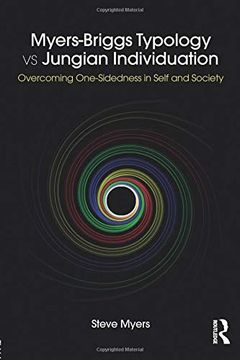Compartir
Myers-Briggs Typology vs. Jungian Individuation (en Inglés)
Steve Myers (Autor)
·
Routledge
· Tapa Blanda
Myers-Briggs Typology vs. Jungian Individuation (en Inglés) - Steve Myers
39,18 €
41,24 €
Ahorras: 2,06 €
Elige la lista en la que quieres agregar tu producto o crea una nueva lista
✓ Producto agregado correctamente a la lista de deseos.
Ir a Mis ListasSe enviará desde nuestra bodega entre el
Martes 11 de Junio y el
Viernes 14 de Junio.
Lo recibirás en cualquier lugar de España entre 1 y 5 días hábiles luego del envío.
Reseña del libro "Myers-Briggs Typology vs. Jungian Individuation (en Inglés)"
In Myers-Briggs Typology vs Jungian Individuation: Overcoming One-Sidedness in Self and Society, Steve Myers unravels the century-long misinterpretation of Jung’s seminal text, Psychological Types, to show how Jung’s thinking offers solutions to the conflicts that have torn apart our societies. By challenging the popular interpretation of the Myers-Briggs Type Indicator® and similar instruments, Myers argues that we have not only missed Jung’s main proposition, but our contemporary interpretation runs counter to it. Myers aims to rediscover the overlooked argument of Jung’s Psychological Types and make it of practical relevance to contemporary issues. He intends to refocus rather than discard Myers-Briggs typology, showing that there are further stages of development after becoming a type and that typological principles have a much broader application. Raising queries about the way typology is used in contemporary society, Myers uses literary examples, such as Romeo and Juliet and Carl Spitteler’s Prometheus and Epimetheus, to show how one-sidedness leads to conflict and to illustrate Jung’s solution to the problem of opposites. He also applies this to real-life political crises by examining the decision-making of key political figures, such as Nelson Mandela, Robert Mugabe, and those involved in Brexit or the Northern Ireland peace process. The latter part of the book relates Jung’s process of typological development to his later writings on alchemy, notably the axiom of Maria, to show how they all have a common goal, the transformation of attitude. The book concludes by analysing the implications of the divergence of Myers-Briggs typology and Jungian individuation for the communities who use those ideas. This book puts Jungian individuation back at the forefront of debate and will be essential reading for intermediate and advanced users of Myers-Briggs typology. Due to its political relevance, it will also be of interest to Jungian analysts and their clients, and to academics and students of Jungian and post-Jungian ideas and political science.
- 0% (0)
- 0% (0)
- 0% (0)
- 0% (0)
- 0% (0)
Todos los libros de nuestro catálogo son Originales.
El libro está escrito en Inglés.
La encuadernación de esta edición es Tapa Blanda.
✓ Producto agregado correctamente al carro, Ir a Pagar.

